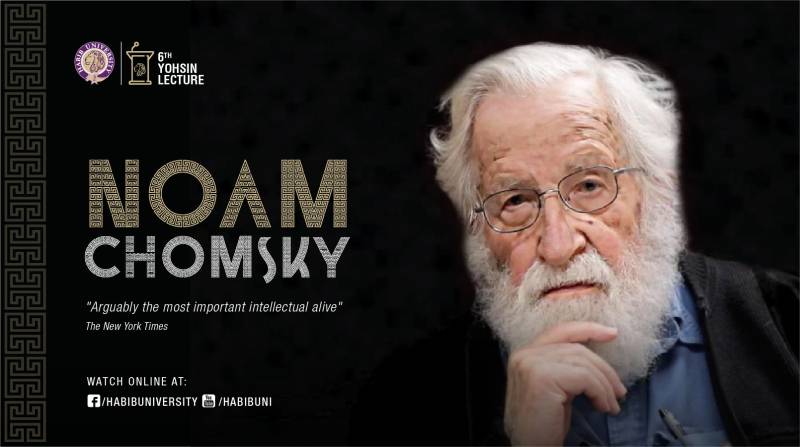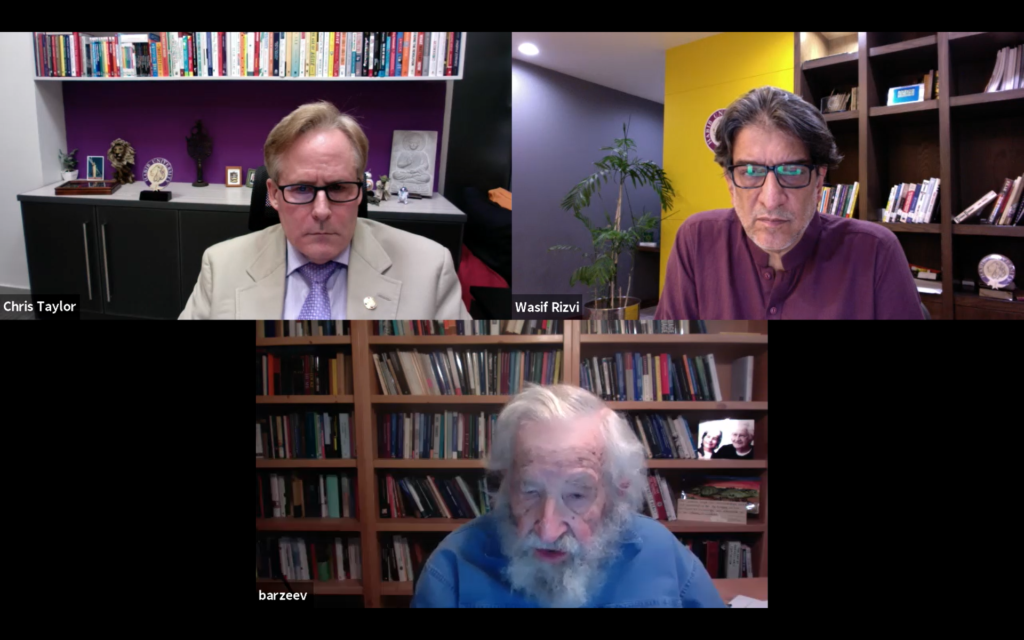
"We are in an extraordinary situation in human history. Survival is hanging by a thread," warns distinguished scholar, according to a Press Release by Habib University. Chomsky termed religious superstition as a major obstacle to scientific progress in Pakistan.
Avram Noam Chomsky, an internationally recognized linguist, philosopher, social critic, and a political activist, delivered a thought-provoking lecture on December 7th as part of Habib University’s flagship Yohsin Lecture Series. Delivering the lecture titled ‘Bullet Dodged or Merely Delayed: Reflections on the Future of Democracy, Nuclear Proliferation and the Looming Environmental Catastrophe in a Post-Trumpian World,’ Professor Chomsky discussed the recent outcome of the US presidential elections, as well as the escalated nuclear threat, fading democracy and environmental catastrophe the world is facing today.
He contextualized his lecture in relation to the possible scenarios emerging in the wake of the 2020 US election and the deteriorating human condition in the 20th century, that he called a ‘tremendous burden and an unprecedented challenge’ for the world politics to take on.
Addressing some of the most crucial themes central to the 21st century, Dr. Chomsky highlighted the four terminal threats to humanity: nuclear war, the environmental catastrophe, deterioration of worldwide democracy, and the recent Covid pandemic. He was of the view that the world is on the brink of catastrophe. He said, “The world is suffering from the pandemic severely, but it is the least of the four crises, we will emerge from the pandemic though at a terrible and unnecessary cost.” At the same time, he expressed his concern regarding the three other crucial threats, which are significantly changing the future dynamics of world politics.
Professor Chomsky said that the world today faced an increasing and real threat of nuclear war, and that any such war would prove devastating for not only the countries involved, but the effects of the nuclear winter would spread to the rest of the world. Expressing his ideas on the neoliberal world order, expansion of American democracy in the post-World War II global dispensation, and the most recent mismanagement of the pandemic, Chomsky emphasized, “the present generation is facing questions that have never arisen in human history and will never arise again unless given an appropriate answer.”
Dr. Chomsky was of the view that, “The crises that we face today – nuclear weapons, environmental catastrophe, destruction of democracy, pandemic ... and many others – have solutions,” but “autocrats and demagogues” would never implement these solutions, and that “it has to be an engaged, informed public in a vibrant democracy” that will tackle these issues.
He advised universities located in the global South to preserve a rational educational system that deals with the reality of the world. He lamented Pakistan’s drifting away from science, and urged for the sake of the country’s future, the incorporation of science into academics and the outlook of the world.
Professor Chomsky is a Laureate Professor at the University of Arizona and Institute Professor Emeritus at the Massachusetts Institute of Technology, the author of more than 100 books, and the recipient of numerous international awards, including the Kyoto Prize, the Helmholtz Medal, and the Ben Franklin Medal in Computer and Cognitive Science.
 The lecture was given as part of Habib University's flagship Yohsin Lecture series. The Lecture series aims to bring to Pakistan leading international scholars who are changing the world by their excellent scholarly contributions, and engaging the community in thoughtful intellectual exploration.
The lecture was given as part of Habib University's flagship Yohsin Lecture series. The Lecture series aims to bring to Pakistan leading international scholars who are changing the world by their excellent scholarly contributions, and engaging the community in thoughtful intellectual exploration.
Avram Noam Chomsky, an internationally recognized linguist, philosopher, social critic, and a political activist, delivered a thought-provoking lecture on December 7th as part of Habib University’s flagship Yohsin Lecture Series. Delivering the lecture titled ‘Bullet Dodged or Merely Delayed: Reflections on the Future of Democracy, Nuclear Proliferation and the Looming Environmental Catastrophe in a Post-Trumpian World,’ Professor Chomsky discussed the recent outcome of the US presidential elections, as well as the escalated nuclear threat, fading democracy and environmental catastrophe the world is facing today.
He contextualized his lecture in relation to the possible scenarios emerging in the wake of the 2020 US election and the deteriorating human condition in the 20th century, that he called a ‘tremendous burden and an unprecedented challenge’ for the world politics to take on.
Addressing some of the most crucial themes central to the 21st century, Dr. Chomsky highlighted the four terminal threats to humanity: nuclear war, the environmental catastrophe, deterioration of worldwide democracy, and the recent Covid pandemic. He was of the view that the world is on the brink of catastrophe. He said, “The world is suffering from the pandemic severely, but it is the least of the four crises, we will emerge from the pandemic though at a terrible and unnecessary cost.” At the same time, he expressed his concern regarding the three other crucial threats, which are significantly changing the future dynamics of world politics.
Professor Chomsky said that the world today faced an increasing and real threat of nuclear war, and that any such war would prove devastating for not only the countries involved, but the effects of the nuclear winter would spread to the rest of the world. Expressing his ideas on the neoliberal world order, expansion of American democracy in the post-World War II global dispensation, and the most recent mismanagement of the pandemic, Chomsky emphasized, “the present generation is facing questions that have never arisen in human history and will never arise again unless given an appropriate answer.”
Discussing the causes for the deterioration of democracy in the US over the last 40 years, he pointed out that “[a] tiny fraction of the population... has doubled their share of wealth,” with 0.1 percent of the population now controlling 20 percent of the country’s entire wealth. This he said, “Has had a very harmful effect on the functioning of democracy. When you concentrate wealth to that extraordinary extent, it’s going to spill over to the way the government functions,” highlighting that the basic social structure on which a functioning democracy rests had been dismantled.
Dr. Chomsky was of the view that, “The crises that we face today – nuclear weapons, environmental catastrophe, destruction of democracy, pandemic ... and many others – have solutions,” but “autocrats and demagogues” would never implement these solutions, and that “it has to be an engaged, informed public in a vibrant democracy” that will tackle these issues.
He advised universities located in the global South to preserve a rational educational system that deals with the reality of the world. He lamented Pakistan’s drifting away from science, and urged for the sake of the country’s future, the incorporation of science into academics and the outlook of the world.
Professor Chomsky is a Laureate Professor at the University of Arizona and Institute Professor Emeritus at the Massachusetts Institute of Technology, the author of more than 100 books, and the recipient of numerous international awards, including the Kyoto Prize, the Helmholtz Medal, and the Ben Franklin Medal in Computer and Cognitive Science.
 The lecture was given as part of Habib University's flagship Yohsin Lecture series. The Lecture series aims to bring to Pakistan leading international scholars who are changing the world by their excellent scholarly contributions, and engaging the community in thoughtful intellectual exploration.
The lecture was given as part of Habib University's flagship Yohsin Lecture series. The Lecture series aims to bring to Pakistan leading international scholars who are changing the world by their excellent scholarly contributions, and engaging the community in thoughtful intellectual exploration. 